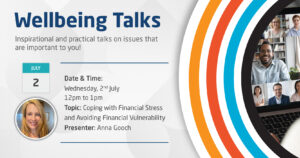News

Combatting loneliness
Isolation and loneliness are common feelings to experience, especially throughout the colder, darker months. There are a lot of ways that you might choose to connect with others if you are feeling alone or withdrawn.
- Write to a stranger: WarriorKind – Empower – Inspire – Support is a free online mental health community that encourages conversations that support positive wellbeing.
- Call a befriending service: Befriending Directory | Find a Befriender | Befriending Networks – Look for locally operating befriending services and have a chat over the phone.
- Utilise social media: Consider joining member groups on Facebook to enjoy a sense of community. Online social clubs are a great way to connect with others too.
- Become a volunteer: Find an organisation that means something to you and offer to support them through voluntary work – or even volunteer at a local charity shop!
- Connect virtually with friends and family: Use Microsoft Teams and Zoom freely to connect with those further afield!
- Attend local support groups: Several local community groups exist to allow a safe space for people to share their personal experiences, often tailored to specific groups of individuals too.
Some resources that may be useful:
- Find a community support group or organisation – GOV.UK
- Andy’s Man Club | #ITSOKAYTOTALK | Andy’s Man Club
- Age UK | The UK’s leading charity helping every older person who needs us
- Home | Men’s Sheds Association | UKMSA
We acknowledge that it can be difficult to form new relationships with others if you are struggling with low mood and feeling alone. If you are struggling with reaching out and connecting with others, contact EIC and we can help you along in the right direction.
Readying for Retirement?
This month, our wellbeing talk focused on how we navigate change and life transitions, homing in on retirement, in particular.
Approaching retirement can be daunting. Retiring is a huge life event and can sometimes lead to feeling like your identity changes, as well as everything around you.
How can I prepare for my approaching retirement – the practical!
- Plan what you’re going to do with your time. When you’ve been working very hard and you’ve been working long hours, you tend not to have had any time for hobbies. Start thinking about a hobby or interest that you would like to pursue.
- Structure your days, especially if you are used to a daily routine around your job.
- Connect with new and old friends, because your social circle changes when you leave work. Consider joining a club, do an evening class, or simply invite a neighbour in for coffee.
- Go out and do things – experience news things too! There are always free things to do, locally. Look at the upcoming months and schedule in some activities that you will enjoy.
- Stay positive and look for the opportunities. Retirement doesn’t have to translate to “doing nothing”. Why not consider volunteering locally, or helping with community initiatives?
- Set small goals to maintain a sense of purpose and success. Consider milestones that you would like to meet and write them down, then think about how you might reach them and the steps to take!
- Consider a “bridge” job – which means a less-stressful secondary career, perhaps part-time, that can bring enjoyment without place too much demand on you.
- Create a new budget by reviewing your new financial situation and your lifestyle choices moving forward. What do you need in your post-career life? Do you need to reallocate your funds from travel expenses to leisure and entertainment? You may identify that you have excess funds or that you want to pull back in certain areas to allow for a better balance.
Retirement is a major life transition, so it is normal to experience some stress, anxiety, and even sadness about such changes. Learning to relax, having more time on your hands, and dealing with changes in your finances can be tough. Consider reaching out to EIC if you are struggling. We are able to offer emotional and practical support, including financial assistance.

Homelessness
Homelessness can be incredibly isolating to those experiencing it. It can happen to anyone. Someone may become homeless for a number of reasons such as lack of affordable housing, poverty and unemployment, or life events that lead to homelessness. This may be linked to relationship breakdowns, loss of a job, mental and/or physical health problems or substance misuse. Sometimes the person is unable to afford rent or mortgage payments anymore.
It may include rough sleeping, people living in sheds, garages and other unconventional buildings, sofa surfing, hostels and unsuitable temporary accommodation such as B&Bs. Sadly, homelessness figures continue to rise in the UK. *Crisis – Homelessness: Causes, Types and Facts | Crisis UK
There are so many damaging assumptions and stereotypes surrounding homelessness and those experiencing it. For most people, it’s not something that happens overnight and is out of their control. As we enter the winter, it is important to remain vigilant and have resources on hand in the instance that someone finds themselves homeless.
How to spot the signs of homelessness
- Changes in behaviour: Whilst attitude and behaviour may not be a direct reflection of homelessness, changes can be demonstrative that someone is struggling with their circumstances. If someone is showing signs of stress, isolation or struggling to engage in others, this could be a sign that support is needed.
- Self-neglect: Physically, the person may struggle to keep on top of personal hygiene and clean clothing. They may be without access to a shower/bath and facilities to wash clothing items.
- Defensive answers to questions: The individual may become defensive when asked questions about where they are living. Often, people feel shame around homelessness and may be embarrassed if asked, which is why it is imperative not to make any assumptions, or judgements.
- Poor timekeeping: Often people experiencing homelessness are in employment. They may be sleeping in their car, or sofa-surfing whilst trying to hold down steady employment. This can be a challenge to balance. Meeting deadlines and being prompt can be difficult.
How to help
Conversations around homelessness can be very challenging because it is a sensitive topic. Regardless of whether it should be sensitive – it is, and we need to respect those around us. Being aware of the shame that often comes with topics of homelessness helps us to be more sensitive and empathetic.
As such, it’s never a good idea to directly ask someone if they are homeless based on one or two warning signs. If you point out that they’ve worn the same shirt three days in a row and ask if that means they’re homeless, you may cause offense. Behavioural observations are good indications, but if you want to offer help, it’s important to have an honest conversation, free of assumptions and judgment.
So, how do you do that? Here are a few ideas:
- State your concerns based on observations and offer help specific to them.
For example, “I have noticed you’ve worn that shirt a lot lately. Do you need help with laundry?” This communicates your concern and leaves the door open for the other person to explain. If they aren’t ready to tell you everything, they might at least let you help with the problem at hand—in this example, washing their dirty laundry.
- Ask open-ended questions about their living situation. An open-ended question is one the other person can’t answer with a simple yes or no. Instead of asking if they have somewhere to sleep, ask what their living situation is like.
- Ask if you can help with anything. If they’ve given you any hints at all that they’re in need, don’t hesitate to offer help. It doesn’t need to be specific—just say you’re there for them and will help in any way you can.
- Be genuine and follow through with what you say you will do.
Helping might look like referring them to supportive organisations in your area that offer housing services or assisting the person to make initial phone calls. It could be as simple as giving them a helpline number to call in the event of a crisis. Remember, it isn’t always about fixing the problem. Care, compassion and empathy really goes a long way towards supporting those who are struggling.
If you are concerned for someone, or are experiencing homelessness yourself, please consider contacting the Electrical Industries Charity for advice and guidance.

